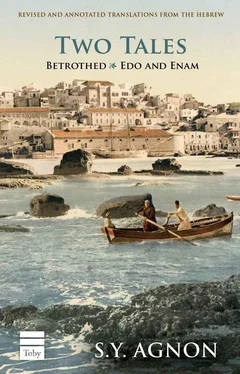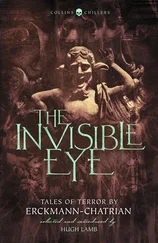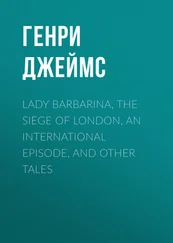Much had happened in the lives of both men. Yehiel Luria, the father of Leah, had begun as a yeshiva student, devoting himself to the Torah in the traditional fashion; at times for its own sake, at times for the security afforded by a rabbi’s life, at times for the prestige it carried, and at times because he could imagine no possible way of life without the Torah. But winds of change began to blow through the yeshiva walls; among them, a purifying wind that brought new promise of national revival. The students of the yeshiva began to speak of God’s prophecies, of the return to Zion and the sprouting of the horn of salvation for the house of Israel in the Holy Land. Some of them were later to betray their own words; others had the privilege of fulfilling in their lives what they sought after in their hearts. And when Yehiel heard that in the Land of Israel there were Jews who lived upon the soil, he resolved to go there and fulfill the Torah through working the land. He saw himself joining a settlement and becoming a farmer, sowing seed with one hand and holding his Talmud in the other; or following the plough with his copy of the Jerusalem Talmud resting upon it, thus at once fulfilling the Torah of the Land of Israel and the working of its soil. When his time came to be drafted into the Tsar’s army, he fled for the Land of Israel and entered one of the yeshivas in Jerusalem. He had thus achieved the merit of following the Torah; but not of fulfilling it through toil, for the yeshivas were remote from the pioneer community in spirit, and work on the land was considered profane by the people of Jerusalem. He went on with his studies, much as he had done outside the country, except that there he had had great hopes for his life in the Land of Israel, whereas in the Holy Land itself half his hopes were gone. And now he was a married man and father of a daughter; he began to think hard of the practical future. He took what remained of his wife’s dowry and went into business. The result was that he lost her money and was left with nothing but the Torah he had learned, and even that was not all it should have been. Once, however, he happened to accompany a collector of donations and tithes who was making his rounds of the settlements. He saw the Jewish people at work in the fields and vineyards, and although in those days the settlers were held in ill repute among the people of Jerusalem, Yehiel ignored all this and hired himself out to one of the farmers. He turned himself into a working man, and suffered what had to be suffered, and rejoiced that at last he had been privileged to till the holy soil. But not long afterwards, the farmers of the settlements assigned their land to Baron Rothschild’s officials, and all the joy was gone from their work. Yehiel went away to another place, and then to yet another, until his wanderings brought him to upper Galilee, where he became a teacher. He spent himself in that effort, but received no satisfaction from it, for his pupils did not respond to what he tried to teach. So he left his school and went down to Jaffa, and with the help of his wife’s relatives in Berlin started a shop for spades, pruning hooks and other tools needed on the land. Anyone coming from the villages found in him a friend and comrade and a good counselor.
Very different was the story of Boris Heilperin, Rachel’s father. From early childhood he had received a modern education, and when he finished his studies, he became manager of a brickyard. His home was a meeting place for the Lovers of Zion, and later, for the “Political Zionists.”
In the great Uganda schism, Heilperin suddenly resigned from his post in the brick works and left behind him both groups, the “Zionists” and the “Zionists of Zion.” With his family he emigrated to the Land of Israel and joined a pioneer settlement that had a number of members of the Bilu group, with whom he had exchanged cordial letters. But not long passed before a dispute flared up among them. Heilperin said to himself, If I cannot live in harmony among these comrades, to whom I am bound in heart and soul, how much less so will I be able to live with the rest of my countrymen? So he went and rented fields from an Arab, and he and his household worked the land as ordinary farmers, until his children were grown to school age. Now there was no school within the village or anywhere near it; so he left his farm land and came to Jaffa, and opened a shop there for lime, cement and construction materials. There was no blessing on his business for the same reason that Luria had none: neither was accustomed to commerce, and it was a time of recession. Also, they gave their attention to the affairs of the Jewish Settlement rather than to their own. All the same they were content with their lot, and offered thanks, one to God, the other to Fate, that they were privileged to live in the Land of Israel. Though their views differed, they respected one another. Luria held Heilperin in esteem for his determination, and Heilperin esteemed Luria for his integrity, while the newer generation respected them both, not only for these virtues but just because they were “respected.” Their homes were open to all, teachers and writers were warmly welcomed. From four o’clock until ten at night the samovar was lit and tea awaited you. Both men had a liking for Dr. Rechnitz. Rachel’s father forgave him for coming from the Austro-Hungarian Empire and for not speaking Russian. Leah’s father was even glad of this; he would not have minded, in fact, had Rechnitz come from Galicia, since he had married a Galician woman himself. Like the enlightened people they were, they did not try to rush Rechnitz into declaring his intentions, but waited patiently for that moment on which the fathers of daughters set all their hopes.
X
Rachel had already heard from her brother, who was a pupil at the school where Rechnitz taught, that important visitors had called on his teacher. An old gentleman and a grown girl. The old gentleman stooped, like all men of his age from abroad. But the girl was tall and lovely. The clothes she wore were not to be seen anywhere in the Land of Israel.
Rachel said to Rechnitz, “I hear you have guests.” He nodded.
“Who are they?” she asked.
“People from my city.”
“And who is the girl?”
“She’s the daughter of the old gentleman.”
“Is she beautiful?”
“That depends on one’s taste.”
“My brother has told me about her.”
Rechnitz looked up. “What did he say?”
“Why don’t you tell us a little yourself? You’re very silent.”
“There’s not much to tell. When I was a boy, our house was next to that of Herr Ehrlich, and I used to be in and out of his home, as happens with neighbors. When Frau Ehrlich died, and even before then, when my parents moved elsewhere, I gave up visiting, because of the distance and because we weren’t on the same neighborly terms. Now it happens that the Consul and his daughter are traveling around the world, and on their way back from Africa they are spending four or five days in the Land of Israel.”
“And what about her?” asked Rachel. “I mean, the Consul’s daughter?”
“She’s with her father; and on their way home they have come to see the Holy Land.”
Rachel smiled rather mysteriously; her eyes resumed their usual look of indifference. Rechnitz blushed. He thought of the many favors the Consul had done him; yet he had shown little gratitude by this offhand way of referring to him. He looked across at Leah.
“Leave him alone, Rachel,” said Leah. “Can’t you see that Dr. Rechnitz has nothing to say?”
“He may have nothing on his tongue,” said Rachel, “but I think he has something on his mind. Tell us about it, Doctor.”
“She is the daughter of my benefactor.”
Читать дальше












